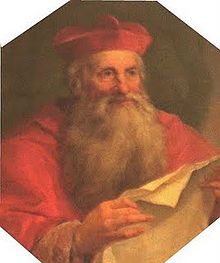This is an old revision of this page, as edited by Space Cadet (talk | contribs) at 17:48, 14 April 2008 (Prussia did NOT exist as a country yet! It was Poland, P O L A N D!). The present address (URL) is a permanent link to this revision, which may differ significantly from the current revision.
Revision as of 17:48, 14 April 2008 by Space Cadet (talk | contribs) (Prussia did NOT exist as a country yet! It was Poland, P O L A N D!)(diff) ← Previous revision | Latest revision (diff) | Newer revision → (diff)
Stanislaus Hosius (Template:Lang-pl) (5 May 1504 in Cracow, Poland - 5 August, 1579 in Capranica Prenestina, Italy) ) was a papal legate to Poland, a cardinal, and a Prince-Bishop of the Bishopric of Warmia.
Hosius was the son of Ulrich Hos of Pforzheim and was born in Cracow during a time when many German and Italian immigrants (mostly craftsmen and artists) resided in the city. Hosius studied law at the University of Padua and the University of Bologna. He became Bishop of Chełmno in 1549 and Prince-Bishop of Warmia in 1551. Hosius had Jesuit sympathies and actively opposed the Protestant Reformation, going so far as to desire a repetition of the St. Bartholomew's Day massacre in Poland. Apart from its being "the property of the Roman Church," he regarded the Bible as having no more worth than Aesop's Fables.
Hosius was not distinguished as a theologian, though he drew up the Confessio fidei christiana catholica adopted by the Synod of Piotrków in 1557. He was, however, supreme as a diplomat and administrator. The Pope consecrated Hosius to fight the ongoing conversions to Protestantism. Hosius and Marcin Kromer were the two bishops most instrumental in keeping Poland's Warmia region Catholic, while the Ducal Prussia became Protestant in 1525. Hosius was called to the Imperial seat at Vienna in 1559, where he was to work on the reopening of the Council of Trent. For his successful work Hosius was promoted to cardinal in 1561, returning to Warmia in 1563. In 1566 Pope Pius V consecrated him as Papal Legate to Poland.
Besides carrying through many difficult negotiations, he founded the lyceum of Braniewo (Braunsberg) in order to counter the rapidly spreading Protestants. It became the centre of the Roman Catholic mission among Protestants. In 1572 Pope Gregory XIII declared Hosius a member of the Congregatio Germania. He died at Capranica near Rome on 5 August 1579.
A special friend to Hosius was Blessed Peter Canisius. Both Kromer and Hosius left many records of their German language speeches and sermons in their years of duty in the Bishropic of Warmia. They were later translated to Czech, English, and French.
A collected edition of his works was published at Cologne in 1584 ( Life by A Eichhorn (Mainz, 1854), 2 vols).
References
 This article incorporates text from a publication now in the public domain: Chisholm, Hugh, ed. (1911). Encyclopædia Britannica (11th ed.). Cambridge University Press.
This article incorporates text from a publication now in the public domain: Chisholm, Hugh, ed. (1911). Encyclopædia Britannica (11th ed.). Cambridge University Press. {{cite encyclopedia}}: Missing or empty|title=(help)